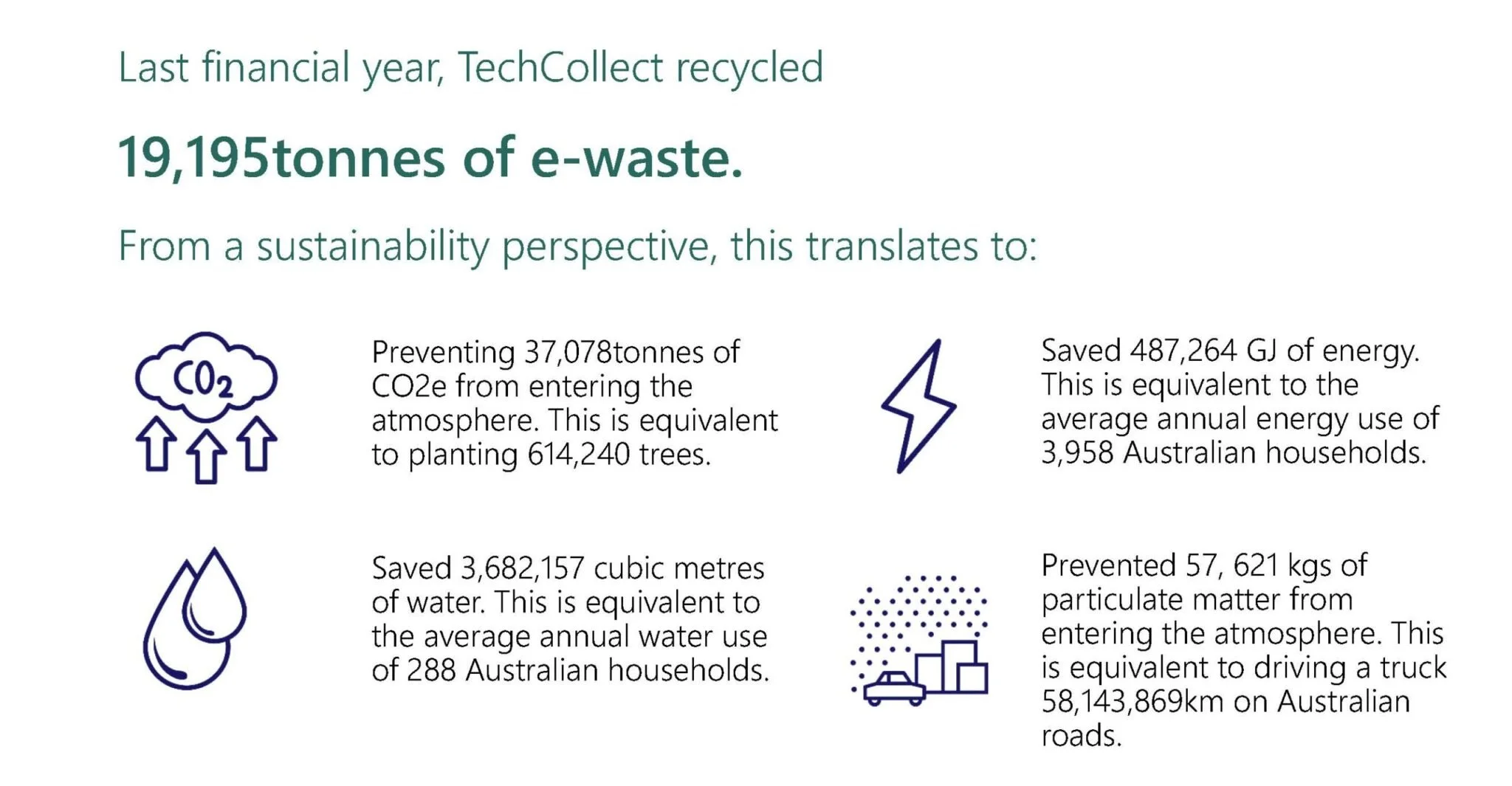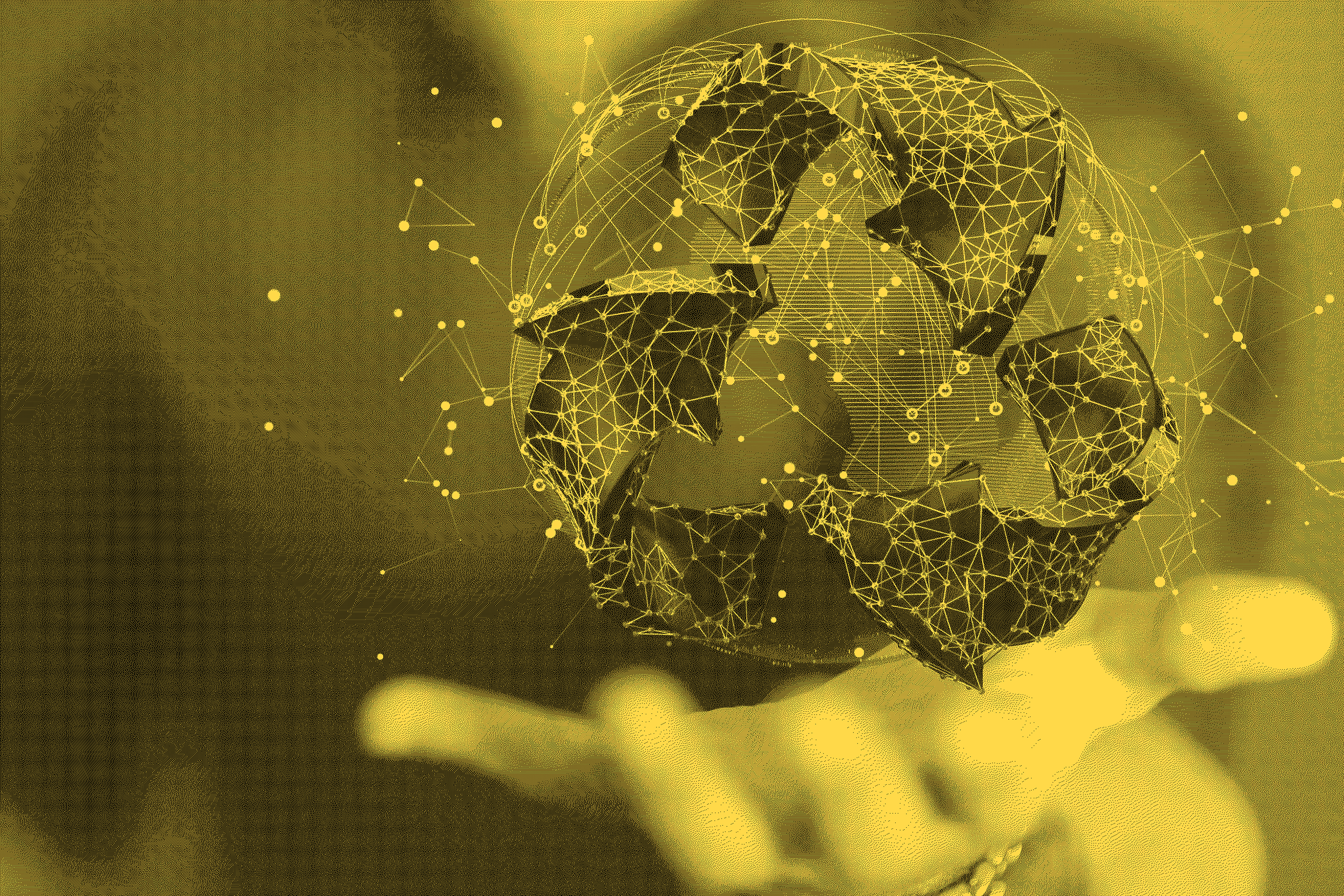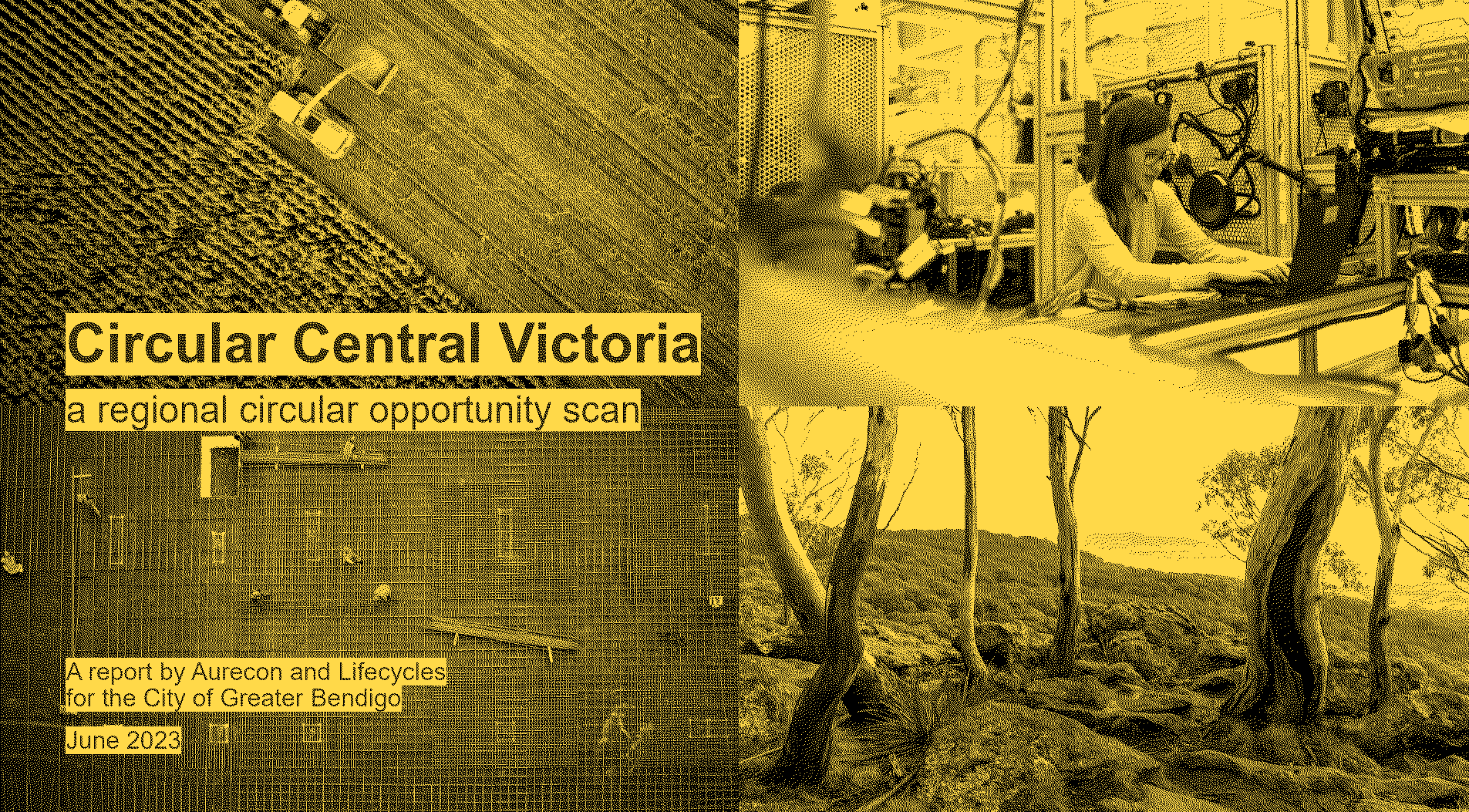Projects
Our projects have helped clients deliver impactful change across a wide range of sectors and service areas.
Project
Category
Date
Strengthening the sustainability of Rubus Berry production
Annual LCA of ANZRP’s e-waste recycling program
Each year since FY16, Australia & New Zealand Recycling Platform (ANZRP) engages Lifecycles to undertake a comprehensive LCA to evaluate the environmental impacts of its operations within its TechCollect program and across the whole value chain.
The study includes a thorough analysis of the environmental impacts from the point of e-waste drop off at a collection site, through to logistics and recycling, all the way to downstream processing and final disposition of commodities.
FY23 was an improvement on FY22, with 19,195 tonnes of e-waste recycled through TechCollect!
This improvement was driven by:
An increase in plastics being recycled compared with last year, leading to savings in the avoidance of production of virgin plastic material
A volume increase in manually disassembled compared with mechanical pre-processing (from 50.5% to 58.2%)
Improved freight efficiency (3.3% reduction in freight kms for the same tonnage shipped)
An improved water model adopted starting FY23 and continuing thereafter
An upgraded model for printed circuit board recycling implemented from FY23 onward to enhance accuracy.
From Measuring ANZRP’s environmental impact by ANZRP, 2023. Copyright 2023 ANZRP.
Strengthening the sustainability of Rubus production
In a mission to develop a long-term sustainability program for the Rubus Berry industry, Hort Innovation and Lifecycles are embarking on a Life cycle assessment (LCA) project aimed at generating comprehensive information and metrics about the environmental performance of raspberry and blackberry production in Australia.
The primary objective of the LCA study is to generate baseline and benchmark metrics for the industry’s carbon footprint and water footprint. This will give growers and industry associations an understanding of the scale, significance, and sources of greenhouse gas (GHG) emissions and potential water use impacts. By doing so, the industry can identify potential risks, address data gaps, explore opportunities for reducing environmental footprints, and construct positive environmental narratives for the industry. This can feed into a sustainability strategy, via a workshop to be conducted as part of the project.
The project team is hoping for grower participation in the project, which will help generate better quality data and more useful findings.
Growers interested in being case study farms in Stage 3 of the project (approximately between March and June 2024), may contact the project team below.
Remarkable recycling initatives (roundup)
We've always emphasized the importance of reducing waste through minimizing consumption and re-use… and in cases where re-use isn’t feasible, we foster innovation.
Spanning from Container Deposit Scheme, waste oil recycling, advanced plastic recycling facilities and ongoing work with recycling bodies, Lifecycles has helped the recycling industry in more than one way and we’re proud to share some highlights.
Container Deposit Scheme (CDS):
The Container Deposit Scheme (CDS), launched by the ACT Government in 2018 and managed by Exchange for Change, is a project that encourages participants to return empty drink containers at designated points in Canberra, offering a 10-cent refund per item. Lifecycles played a pivotal role in devising the calculations for CDS in ACT and NSW, establishing a foundation for the environmental benefits of material recovery and circulation. Other state governments quickly followed suit - with Victoria only recently launching their programme and Tasmania set to launch in early 2024. This initiative positions Australia as the first continent to adopt Cash for Containers.
See more information here: https://www.cleanup.org.au/containerdepositscheme
Waste Oil Recycling:
Waste oil recycling involves the re-refining of used oil products to extend their life and diminish their environmental footprint. Annually around 500 million litres of lubricating oil is sold in Australia. Considering that it takes one litre of oil to contaminate one million litres of water and a single automotive oil change produces 4 to 5 litres of used oil, we need to recover as much as possible.
We take pride in our collaboration with Southern Oil Refinery promoting the most beneficial reuse of waste oils as new base and fuel oils. These initiatives not only lessen Australia’s reliance on virgin crude oil (by about 900,000 barrels) and environmental impacts but also cut consumer costs.
Advanced plastic recycling facilities:
Advanced plastic recycling facilities: In response to challenges like the RedCycle collapse, we've collaborated with innovative firms like Samsara Eco. Our custom LCA tool empowers Samsara Eco to assess the effects of different inputs and locations. The tool will be a vital component in informing Samsara Eco as the company scales up and works towards achieving its key milestone of recycling 1.5 million tonnes of plastic per annum by 2030.
Lifecycles contributed to a feasibility study for Licella that examined the potential and significant advantages of advanced recycling in Australia. Victoria is poised to play a leading role in establishing an advanced manufacturing industry. Thanks to the recent backing from Amcor and Mondelēz International, Advanced Recycling Victoria, the country's inaugural Cat-HTR advanced plastic recycling facility, is projected to process 12,000 tonnes of end-of-life plastics each year.
Recycling programs
Since 2016, we've partnered with ANZRP, calculating the carbon footprint of recycling mixed television and computer waste. The impact is significant – recycling one tonne of e-waste with ANZRP saves 1,358 kgCO2e emissions (FY22 Report). This equates to avoiding 29,143 tCO2e emissions. ANZRP uses this data to engage members and stakeholders, fostering improvements in environmental performance.
Circular Central Victoria: a regional circular economy opportunity scan
Lifecycles, in partnership with Aurecon, mapped the circular economy landscape in Greater Bendigo, focusing on construction, consumer goods, and agriculture. Working with nine councils in the Loddon Mallee and Loddon Campaspe regions, the project identified nine circular economy opportunities that could divert 688,000 tonnes of waste from landfill annually, cutting emissions by 418,000 tonnes of CO₂ equivalent.These initiatives range from upcycling pre-farmgate food waste to modular construction solutions and local circular manufacturing. Lifecycles provided a quantitative assessment of material flows and stocks, visualised with Sankey diagrams. The project reframed circular economy thinking beyond kerbside recycling, emphasising material consumption and transformation as key drivers of circularity.
Download the full report here: Circular Central Victoria.
QLD Government’s eWaste action plan
The Queensland Government’s draft e-products waste action plan includes a trial for a solar panel recycling program. Queensland energy minister, Mick de Brenni, quotes figures calculated by Lifecycles for a project undertaken for eWaste Watch in 2022. Queenslanders are expected to install 25 million solar panels over the next decade, creating up to 17,000 annual tonnes of landfill waste by 2030. Solar panels currently account for 1,000 tonnes of annual waste in Queensland.
The ACT Container Deposit Scheme Exchange for Change
The ACT Container Deposit Scheme (CDS) is a litter reduction initiative that was introduced by the ACT Government in 2018 and coordinated by Exchange for Change. Participants collect and return their empty drink containers at return points across Canberra for a 10 cent refund on each item. Lifecycles’ LCA study established a robust baseline for the environmental benefits of diverting recyclable waste from becoming pollution or landfill. This information was used to develop a tool for consumers to estimate the impact of their actions, in turn, motivating greater participation in the program.
South Australia organics sector analysis for Green Industries SA
Lifecycles was part of the consortium led by Rawtech to estimate current and potential future benefits of circulating organics through the South Australian economy. The team identified the material flow of discarded organics for five scenarios and quantified the corresponding contributions of the organics sector to SA’s economy, soil health and the environment.
E-product stewardship in Australia for Department of Agriculture, Water & the Environment
Our recently published evidence-based report for Australian Department of Agriculture, Water and the Environment, a collaboration between Lifecycles and Iceni, estimated that in Australia we collectively produce over 520,000 tonnes of e-waste every year.
Read the 'E-product Stewardship in Australia' evidence & executive reports, and be part of the Department's engagement to identify solutions for the better environmental management of Australia’s electrical and electronic equipment.
For the more adventurous, the underlying model developed during the project is also available. We are very proud to have been part of this project and hope that we will be able to keep this model alive by feeding it new information as they arise and to help us keep track of our progress on this issue over time.
Circular economy analysis & opportunities evaluation for Yarra Valley Water
Yarra Valley Water (YVW) commissioned Lifecycles to undertake an explorative study to understand what circular economy means to them as a water utility, and how it translates into action at both strategy and project levels. Lifecycles developed and applied a circular economy framework adapted to water utilities drawing on international best practice in circular economy and sustainability assessment.
Full material flow analyses of construction materials, water and nitrogen flows were undertaken both inside YVW and of its suppliers and customers. These material flows were translated into circularity, water scarcity and carbon footprint indicators and were presented in a staff workshop to highlight where the hotspots were located and to generate a range of solutions to increase the circularity of YVW processes. These options were then tested in the model against circularity, water and carbon footprint indicators.
National Food Waste Strategy Feasibility Study for Food Innovation Australia Ltd
Lifecycles supported Edge Environment, as part of an international consortium to deliver a $400k National Food Waste Strategy Feasibility Study. The study tested whether the Australian Government’s 2017 commitment to halve food waste by 2030 is possible and what actions will increase the likelihood of achieving this target.
Lifecycles was responsible for leading the development of the baseline LCA model underpinning the study and the calculation of life cycle climate, water, land use and cost hotspot assessment.
Wagga Wagga Special Activity Precinct carbon footprint calculator for Department of Planning, Industry & the Environment (NSW)
Carbon Footprint
2019
Lifecycles was contracted as part of the D-Squared consulting group to provide input to the sustainable development agenda for Wagga Wagga’s Special Activity Precinct (SAP). A footprint calculator was developed which covered a baseline model for Wagga Wagga precinct and modelled a wide range of strategies to reduce the carbon footprint of future development of the precinct. This included material exchanges, shared infrastructure and renewable energy supply.
Circular economy for Monash University
Circular Economy
2018
Lifecycles was commissioned by Monash University to conduct a material flow mapping exercise for Monash’s Clayton campus. This study was aimed to better understand the impacts of the goods and services that flow through Clayton in terms of greenhouse gases (GHG), water and material use. A review of Circular Economy activities taking place in Australia and internationally was also provided. The mapping of environmental and material flows, associated with the review of best practice, was used as a basis to provide a set of recommendations and possible actions to Monash University.
Circular economy strategic review for Wesfarmers Department Stores Division (Kmart & Target)
Lifecycles was commissioned by Kmart and Target to review their exposure and positioning in relation to a circular economy and identify a path forward to addressing this in a way that adds value to their business. This work involved the articulation of a business narrative and recommendations for consideration by the Executive Leadership Team, distilling findings from the following process:
analysing business drivers for circular economy approaches internationally and in Australia (including regulation),
benchmarking competitors’ strategies and initiatives,
reviewing existing Kmart policies and initiatives,
impact mapping for Kmart using economic data to obtain a helicopter view of material and energy flows, and
hybrid input-output and process modelling of over 300,000 individual products overall.
Circular economy & climate change scoping study for City of Melbourne
The City of Melbourne commissioned lifecycles to investigate the how a circular economy model may help contribute to reducing emissions and managing climate risk for various city users, business sectors and levels of government. This project involved reviewing international best practice applications of the circular economy principles to city scale emissions reduction planning, articulating how circular economy approaches could be applied to the City of Melbourne and reviewing the City of Melbourne’s municipality carbon inventory.
Who Gives a Crap: Why we love our clients
This month we had a great strategy session with everyone's favourite purveyors of fine toilet paper who gives a crap. Their business model is already fabulous, donating 50% of their profits to building toilets to those in need in partnership with WaterAid. But they really want to walk the talk, which is why they are digging deep to understand the environmental impacts of their products, which come from recycled paper, bamboo and sugar cane by-products. We wanted to say a big thanks for delivering oodles of toilet paper and tissues to our new offices. We'll never be in need again!
Smartcane BMP economic & environmental case study for Department of Agriculture & Fisheries (QLD)
The Queensland Department of Agriculture and Fisheries with support from Lifecycles is currently working with a number of sugarcane growers in the Wet Tropics to evaluate the economic and environmental impact of the Smartcane BMP program, via an SRA-funded research project. The project will be conducted as a series of case studies depicting farms before and after BMP adoption. The first of these case studies, featuring the Salmec growing enterprise in the Far North, is available online. In the case study, growers Mark Savina and Mick Andrejic explain how a series of changes over five years have had a positive impact on the business’s bottom line. The transition to BMP, which began in 2008, has resulted in:
Annual improvement in farm operating return of $150/ha ($124,500/yr total)
124kg less pesticide active ingredients and 1 tonne less nitrogen lost to waterways annually
Annual fossil fuel use reduced by 15 per cent (or 25 tonnes of fuel over the cane life cycle)
Greenhouse gas emissions reduced by 19 per cent annually (equivalent to taking 47 cars off the road each year)
Australian & New Zealand Recycling Platform annual report for ANZRP
ANZRP's Annual Report provides information about the company’s collection and recycling activities under the National Television and Computer Recycling Scheme for the period 1 July 2015 to 30 June 2016.
ANZRP engaged Lifecycles to calculate the average carbon footprint value for the recycling of one tonne of mixed television and computer waste using the life cycle assessment methodology. The goal of this project was to quantify an average carbon footprint value for the recycling of a tonne of mixed television and computer waste managed by ANZRP, for inclusion in their annual report. It involved modelling the emissions associated with ANZRP's collection chain throughout inner regional, metropolitan, outer regional and remote regions in Australia right through to resource recovery of the different waste fractions, from plastic and glass through to a variety of metals.
It was found that when ANZRP recycles one tonne of e-waste this resulted in a saving of 981 kgCO2e emissions. In 2015/16 this equated to avoiding 23,012 tCO2e emissions (on the basis of 23,458 tonnes of e-waste being recycled by ANZRP). Lifecycles found that the CO2 burden associated with collecting, recycling and processing the e-waste is entirely offset by the benefits associated with avoiding the production of virgin materials: in particular, iron, aluminium, copper and platinum group metals. This carbon footprint will provide a baseline for improvement and an opportunity to engage with our Members and other stakeholders on improving environmental performance.
Quantifying the potential benefits of a circular economy to South Australia for Green Industries SA
Working with EconSearch, Colby Industries and University of Queensland, Lifecycles led this watershed study to evaluate potential impacts in terms of job creation, greenhouse gas emissions and energy use if South Australia were to transition to a more circular economy in 2030. The report blended the results from the environmentally extended input output modelling with international and local case studies to demonstrate how a circular economy could benefit the development of the state whilst contributing to GHG reduction targets and supporting energy independence.
Soil Quality Indicators in Life Cycle Assessment Consensus Group
The objective of this group is to get a shared understanding of soil quality issues and indicators in LCA, and to form an informal network of relevant researchers and organisations on this topic. It started as a joint initiative of CIRAD (France), CSIRO (Australia), Agroscope (Switzerland), Joint Research Centre (European Commission) and Lifecycles (Australia).
The 2nd workshop of the Soil Quality Indicators in Life Cycle Assessment Consensus Group was held in Dublin in 2016 in conjunction with the LCA pesticide consensus group. The workshop looked at a broad range of soil quality models and a review of these it’s been undertaken by the European Union.
A set of task groups were established to progress the work over the next 18 months as part of the UNEP/SETAC life-cycle initiative Task group 1B on development of consensus characterisation factors for LCA.
The first international workshop on soil quality indicators in LCA was held in 2015 in Bordeaux, as a side event of the LCM conference 2015. You can download the presentations here.





